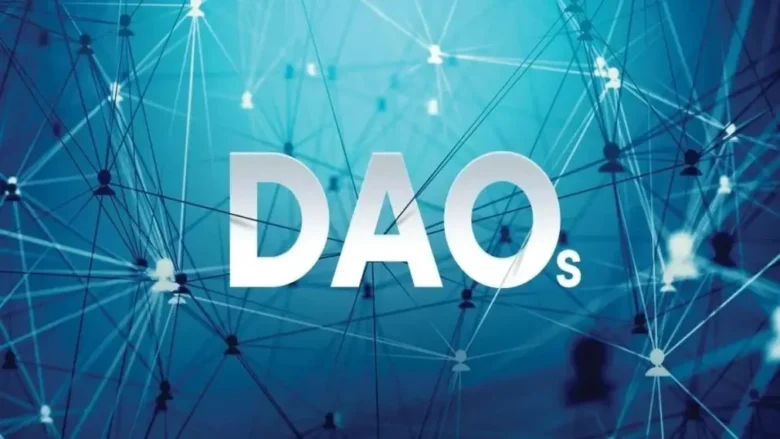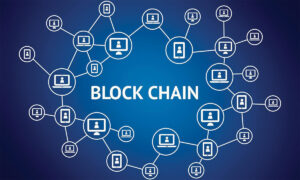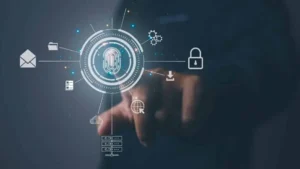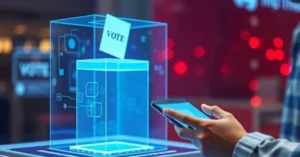Decentralized technologies are disrupting the management of businesses and organizations in the digital age. Decentralized Autonomous Organizations (DAOs) are at the forefront of this shift. Blockchain-based entities are transforming decision-making, authorization, and community collaboration. DAOs use code, community consensus, and smart contracts to replace CEOs, boards of directors, and hierarchical structures. This shift gives people a voice in government and makes systems more transparent, inclusive, and democratic. DAOs have attracted the attention of many businesses and social movements due to their advantages, such as remote work, online communities, and global collaboration. They represent a new governance model for the connected society, not just a technological trend.
DAO: How Does It Work?
DAOs are governed by smart contracts instead of centralized authorities. Blockchain-based DAOs use codes to establish rules and make automated decisions. DAO members use tokens to propose and vote on projects, policies, and partnerships. The blockchain records all activity, making it transparent and immutable. The concept replaces managers and CEOs with community-driven decisions. The goal is to create democratic groups with broad powers. DAOs can manage investment funds, dApps, online forums, and creative groups. DAOs eliminate intermediaries, creating an open, borderless system that allows anyone with an internet connection to contribute, vote, and influence the organization.
Trust and Transparency in DAO Governance:
Transparency is a key advantage of DAO governance. Traditional organizations often make important decisions behind the scenes, meaning stakeholders rarely have insight. DAOs, however, operate entirely on the blockchain, with all proposals, discussions, and votes publicly available. This transparency fosters trust in the community, as members can verify everything. Every DAO vote to fund a new project is publicly recorded, eliminating the need for press releases or internal documents.
In this accountable society, leaders cannot hide decisions or misuse resources. It gives small contributors a voice alongside large stakeholders. In a world increasingly wary of corporations and centralized control, DAOs offer a new model where code builds trust, not charisma. Open governance models attract innovators, developers, and activists who appreciate fair and transparent processes.
Democratizing Decision-Making Through Token Voting:
In DAOs, the community gains authority through token-based voting. DAO members typically receive voting tokens. Owning more tokens increases influence. Unlike company stock, these tokens can be distributed through donations, purchases, or community events. Members use tokens to vote on on-chain proposals. Smart contracts automatically execute proposals that receive enough votes.
This decentralized process reduces bureaucracy and promotes direct participation. Although critics believe token voting favors the wealthy, many DAOs are testing quadratic voting systems or weighted decision-making systems to make governance more equal. Most importantly, this approach empowers everyone to participate, propose improvements, and directly influence outcomes, unlike traditional corporate hierarchies.
Eliminate Centralization and Intermediaries:
Most companies make decisions top-down. Executives set the vision, managers execute it, and employees follow. DAOs fundamentally alter this paradigm. There is no CEO, management, or central authority. All members handle funding allocation and new member onboarding. Smart contracts enable this decentralized leadership model by automatically executing community voting decisions. It significantly reduces bureaucracy and inefficiencies in management. Without intermediaries, decisions are made faster and at a lower cost. DAOs are open-source and borderless, allowing everyone to collaborate, contribute, and benefit. This fosters creativity and distributes power. DAOs are well-suited for online communities, open-source projects, and global collaborations that require inclusivity and transparency.
DAOs as the Future of Work and Collaboration:
With the rise of remote work and the ability to collaborate digitally, DAOs are becoming the next step in collaboration. They offer a workplace without offices, managers, or fixed hours. DAO employees earn cryptocurrency for performance and participation, not for roles or seniority. Open proposals address tasks and projects, and teams form spontaneously around goals.
This creates an atmosphere of flexibility, meritocracy, creativity, and initiative. DAOs also provide employees with governance tokens that allow them to influence the organization’s fate. DAOs empower people to work independently and fairly, whether in investment clubs, gaming guilds, or research collaborations. This bold reinvention of work and government aligns with the values of the next digital age.
Conclusion:
DAOs are a new concept for digital organization, collaboration, and governance, not just another blockchain experiment. DAOs make systems more inclusive, transparent, and efficient by replacing centralized authority with decentralized protocols and community consensus. They eliminate intermediaries, empower contributors, and build trust through transparent governance. As more people seek alternatives, DAOs offer a compelling alternative to traditional corporate hierarchies and opaque decision-making mechanisms.
They are transforming finance, art, gaming, and social impact, and their influence is growing. Despite challenges with scalability, legal recognition, and fair voting, DAOs can democratize governance. As technology advances and more people embrace this model, DAOs could become the standard for building and managing organizations in the 21st century.
FAQs:
1. What exactly is a DAO?
Blockchain-based decentralized autonomous organizations (DAOs) use smart contracts and token voting to make decisions without a central authority.
2. How do DAOs make decisions?
DAO tokens vote on proposals. If enough token holders vote in favor, the smart contract automatically executes the members’ suggestions.
3. Are DAOs legal organizations?
Countries are seeking new regulations to legalize DAOs. In some jurisdictions, it is possible to register DAOs as legal entities.
4. Can anyone join a DAO?
Most DAOs are accessible to internet users. Users can join DAOs and manage them by purchasing or earning tokens.
5. What are the risks of DAOs?
Governance manipulation, smart contract issues, and unclear restrictions can plague DAOs. The ecosystem is evolving to address these issues.




